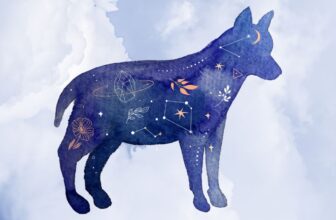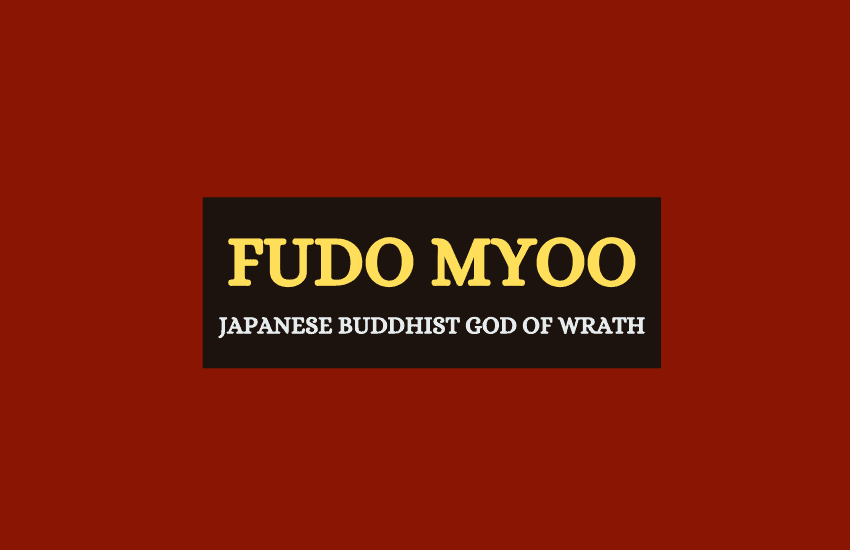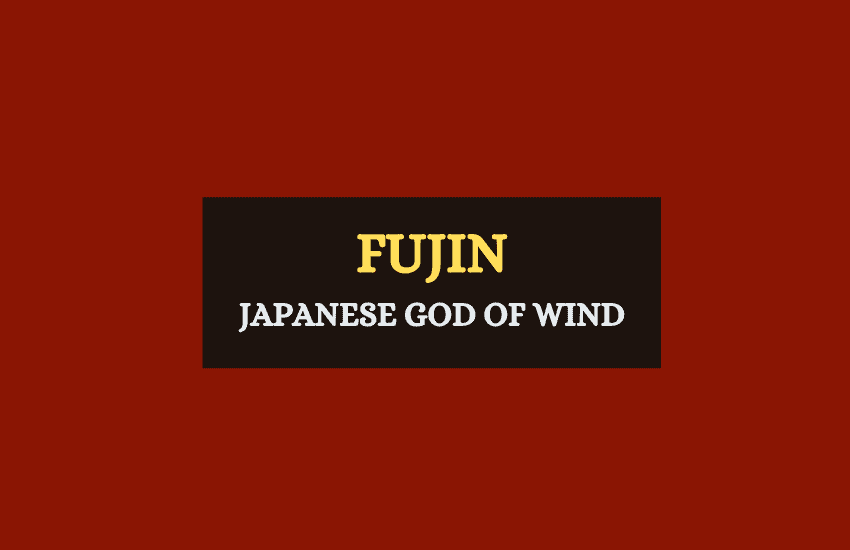
Fujin is the Japanese god of wind, worshipped in Shintoism, Buddhism, and Daoism alike. Like most wind deities in other religions, Fujin isn’t the most famous god in the pantheons of these religions. However, he plays an important role and was highly revered.
A true elder god, he’s one of the several children of the Father and Mother deities of Shintoism – Izanami and Izanagi.
Who is Fujin God?
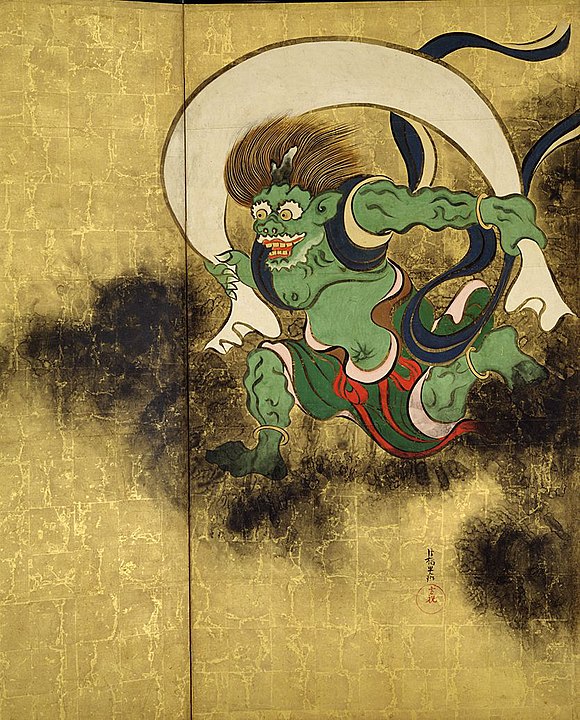
Fujin is most often seen in combination with his more famous brother Raijin, the god of Thunder. Just like Raijin, Fujin also commands respect on his own. Viewed as both a kami (god, divine spirit) and an oni (demon), Fujin is responsible for every gush of wind that blows around the globe.
Fujin’s name in Kanji writing literally translates as Wind God but he’s also known by the name Futen which means Heavenly Wind.
His fame as an oni is owed both to his horrifying appearance and to the rather bizarre circumstances of his birth (discussed below).
Fujin has green skin, wild, flowing red-white hair, and a monstrous face with terrifying teeth. He often wears a leopard skin and his prized possession is a big bag of wind which he uses both to fly around and to create the winds he’s famous for.
Fujin’s Birth – The Birth of a Demon God
Fujin’s birth was traumatic, to say the least. The wind god was born by the Japanese primordial goddess Izanami’s corpse, as she lay in the Japanese Underworld Yomi.
Fujin shares this strange birth with his brother Raijin as well as several other of their siblings such as the kami gods Susanoo, Amaterasu, and Tsukuyomi.
Because of their birth as creatures of the Yomi underworld, Izanami’s children are viewed both as kami gods and as horrifying oni demons.
Once the children were born, Izanami ordered them to chase down and capture their own father, the primordial god Izanagi, as Izanami was angry that he had left her in the Underworld.
Fujin’s father managed to escape Yomi before his vengeful children could catch up to him but they too eventually broke out of Yomi and started sowing destruction around the world at their mother’s behest.
Fujin As A Benevolent Wind God
As both a kami and an oni, Fujin is complex in his behavior and characteristics. Like his brother Raijin, Fujin is also known as a benevolent deity. His winds are often gentle and refreshing, and even his harshest typhoons are sometimes helpful.
Two famous examples of Fujin’s assistance to mortals are the two typhoons credited to both Fujin and Raijin in the late 13th century. Both in 1274 and 1281, as the Mongol hordes were trying to invade Japan by sea, Fujin and Raijin blew their numerous ships into the sea, crushing the Mongol armies, and keeping Japan safe.
Fujin – Inspired by Other Wind Gods
Just as Fujin’s winds travel around the world, so do his name and imagery. Most scholars today agree that Fujin owes his portrayal to other wind gods from across Eurasia. Namely, Fujin is linked with Hellenic portrayals of the Greek wind god Boreas.
Even though Boreas is a lesser-known deity today, he’s older than Fujin. What’s more, Hellenic culture was very well-known all across Eurasia in the ancient times, including in Persia and India. There, Hellenic gods like Boreas influenced many Hindu deities, especially in the Kushan Dynasty where Boreas inspired the wind god Wardo.
From India, these Hindu deities eventually traveled to China where Wardo also became popular. So popular, in fact, that he was also given many different names in China and eventually ended up in Japan under the name Fujin.
In this way, although Fujin is a Japanese god, his origins were inspired by the gods of other cultures.
Symbols and Symbolism of Fujin
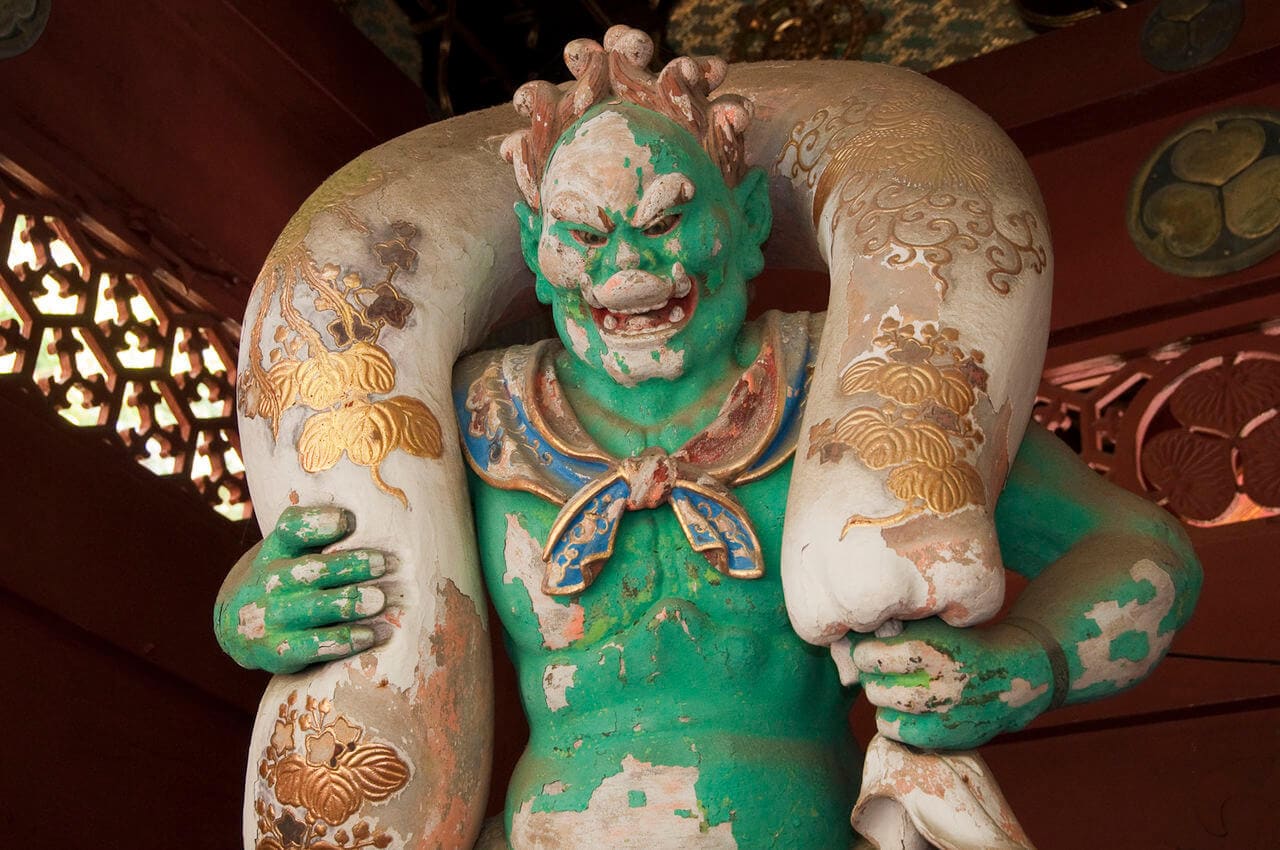
Fujin’s primary symbol was the windbag, which he carries across his shoulders. It is his bag of air which moves the winds around the globe. It’s interesting to note that Boreas also carries a wind bag on his shoulders, further strengthening the contention that Fujin was inspired by other wind gods.
Fujin symbolizes the winds and its characteristics. Just like his winds, Fujin is whimsical and humorous but also quick to anger. He can be devastating when he chooses to be. Both worshipped and feared, Fujin is especially dangerous when he works together with his brother Raijin.
Importance of Fujin in Modern Culture
Like most Shinto kami and oni, Fujin is often represented in Japanese art. His most famous portrayal is as a guardian statue of the Buddhist temple Sanjusangen-do in Kyoto.
In more recent times, he’s also been often featured in Japanese anime and manga. Some of his most famous appearances include the Flame of Recca manga, the Let’s Go Luna! animation, as well as the hit video games Final Fantasy VIII and Mortal Kombat.
Fcat About Fujin
Fujin is the Japanese god of wind.
Fujin is neither good nor evil. He can be capricious, sending either helpful or devastating winds. However, he’s most often associated with destructive winds.
Fujin’s most important symbol is his bag of wind which he carries on his shoulders.
Raijin is Fujin’s brother, and the god of thunder. The two are often depicted together, working alongside each other.
Fujin’s parents are Izanagi and Izanami.
Fujin’s birth was miraculous, as he and many of his siblings emerged from the decaying corpse of their mother.
Fujin is an Oni but is often depicted as a Kami also.
Wrapping Up
Fujin is one of the main gods of the Japanese pantheon, best known for his collaboration with his brother Raijin. He was not an evil god, but one who did his tasks, sometimes with capriciousness.




